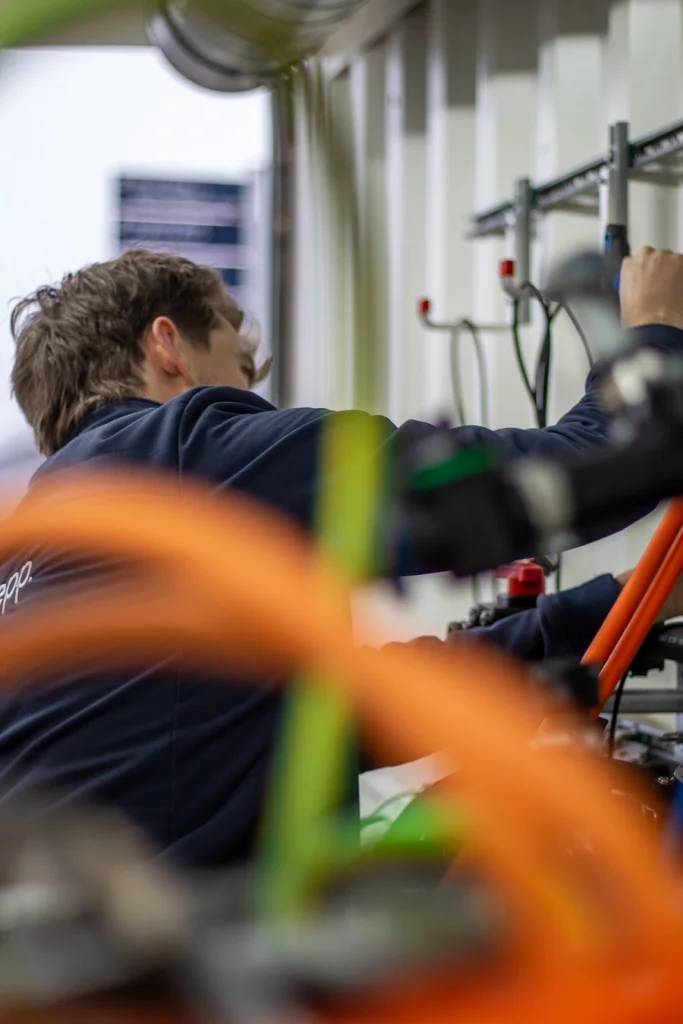Potentially interested in working at zepp? click on this banner to stay up to date on new jobs and opportunities.
Als jij geïnteresseerd bent in ons, dan zijn wij waarschijnlijk ook geïnteresseerd in jou. Dus stel jezelf aan ons voor en laten we kijken of we een match voor elkaar zijn.
Ben jij op zoek naar een uitdagende carrière op het gebied van waterstof en brandstofcelsystemen? Beschouw je jezelf als probleemoplosser en wil je met een dynamisch team werken aan de technologie van morgen?
We can offer you a challenging and dynamic position in a continuously growing team of talented and motivated colleagues. The work atmosphere is informal and we believe in an environment where everyone enjoys a high level of autonomy. We give you the opportunity to learn and grow by implementing your ideas, becoming an essential team member at zepp.solutions.


In the position as mechanical engineer at zepp, you will specialize in mechanical design or in mechanical integration.
As a design engineer you will develop and test core subsystems that will be integrated into a vast variety of applications, ranging from maritime over automotive to aviation applications. In the position as mechanical Integration engineer your responsibilities will lie in the fields of integrating our inhouse developed fuel cell, hydrogen storage and thermal management systems into a wide range of applications
The fuel cell system is the heart of the operation. A compact design enables smart placement of the fuel cell in the application. High efficiency lowers consumption and increases range and endurance. High reliability is a must to be able to replace proven diesel technology. Production scalability through building block approach. As a design engineer for hydrogen fuel cell systems you have to combine a wide set of skills optimising a mechanical design consisting of several subsystems. You will be dealing with different media, temperatures, material specifications and other requirements. The subsystems of the fuel cell system deal with hydrogen, pure water, coolant, high and low voltage. Working on fuel cell modules includes the work of integrating existing components but also developing inhouse components and subsystems.
The largest and heaviest subsystem in most hydrogen applications is the hydrogen storage. The hydrogen storage reaches from the refuelling port on the vehicle, ship or generator via the tanks to the hydrogen interface on the fuel cell module. A large set of high pressure equipment needs integration along the way. At pressures of 350 to 700 bar safety and reliability are of utmost importance. Certification requirements in the different sectors ask for different design approaches in the different applications. The higher the hydrogen capacity, the longer the machine or truck can run before refuelling. The lighter the construction the higher the possible payload. Well performed structural design and analysis results in the largest performance gain when it comes to the hydrogen storage system.
Keeping all systems at their optimum working temperatures is key to enable smooth and reliable operation. Depending on the operation the thermal management subsystem can dictate the maximum power output of the fuel cell system, the more compact and efficient the design, the better the fuel cell performance also at high environmental temperatures. The design and working principle can differ from application to application. Where maritime applications can rely on liquid to liquid heat exchangers, trucks or stationary generators require large surfaces for gas (air) to liquid radiators, larger in size than their diesel counterpart. The thermal management system, an important building block of the hydrogen fuel cell powertrain, filled with challenges and room for novel developments.
Shipping & maritime applications range from inland and harbour vessels to recreational and luxury yachts. A fuel cell system can be used to provide propulsive power or to provide the power needed for hotel utilities.The advantages of fuel cell power are manifold: it is silent, vibration-free, and clean. The larger the energy demand, the more advantageous the use of a hydrogen fuel cell system becomes compared to battery electric energy storage. Hydrogen can be refueled quickly, and it allows for the realization of larger and lighter energy storage solutions. The first application of zepp in the maritime industry was the realisation of a hydrogen fuel cell watertaxi in Rotterdam. Many similar but also larger realisations are following in the coming years.
Heavy duty summarises a wide range of applications. From off-road machines such as excavators, yard trucks and other port machines, to on-road long haul trucks, buses or even generators for zero emission mobile power generation. Zepp has realised a wide range of operations in the past and is continuously expanding into new heavy-duty fields. In 2018 Terberg Benschop and zepp.solutions joined forces to start the development of a fuel cell yard tractor, the YT203-H2, a first of its kind. Since 2022, two Liebherr 916 Litronic wheeled excavators have been operational in the Utrecht area, equipped with a Zepp fuel cell, hydrogen storage, and thermal management system.
The aviation sector encompasses a wide range of applications associated with the aviation industry, both on the ground and in the air. Zepp actively participates in both domains, collaborating with a European partner to implement hydrogen-powered, zero-emission ground power units for aircraft operation at the gate. In this capacity, Zepp manages the comprehensive integration of hydrogen-related components, including the fuel cell, hydrogen storage, and thermal management system. Within the Dutch partnership HAPSS, a consortium dedicated to the advancement of hydrogen-powered commercial aircraft, Zepp takes charge of developing the fuel cell modules.
You can submit an open application through the button below with your CV and motivation letter. Our HR employee will respond to your application by email within three working days.
Not quite ready to apply, but interested in what we have to offer? We’re always happy to get in touch to answer any questions you might have.

| Cookie | Duur | Beschrijving |
|---|---|---|
| li_gc | 6 months | Linkedin set this cookie for storing visitor's consent regarding using cookies for non-essential purposes. |
| lidc | 1 day | LinkedIn sets the lidc cookie to facilitate data center selection. |
| player | 1 year | Vimeo uses this cookie to save the user's preferences when playing embedded videos from Vimeo. |
| sp_landing | 1 day | The sp_landing is set by Spotify to implement audio content from Spotify on the website and also registers information on user interaction related to the audio content. |
| sp_t | 1 year | The sp_t cookie is set by Spotify to implement audio content from Spotify on the website and also registers information on user interaction related to the audio content. |
| UserMatchHistory | 1 month | LinkedIn sets this cookie for LinkedIn Ads ID syncing. |
| Cookie | Duur | Beschrijving |
|---|---|---|
| sync_active | never | This cookie is set by Vimeo and contains data on the visitor's video-content preferences, so that the website remembers parameters such as preferred volume or video quality. |
| Cookie | Duur | Beschrijving |
|---|---|---|
| __hstc | 6 months | Hubspot set this main cookie for tracking visitors. It contains the domain, initial timestamp (first visit), last timestamp (last visit), current timestamp (this visit), and session number (increments for each subsequent session). |
| _ga | 1 year 1 month 4 days | Google Analytics sets this cookie to calculate visitor, session and campaign data and track site usage for the site's analytics report. The cookie stores information anonymously and assigns a randomly generated number to recognise unique visitors. |
| _ga_* | 1 year 1 month 4 days | Google Analytics sets this cookie to store and count page views. |
| AnalyticsSyncHistory | 1 month | Linkedin set this cookie to store information about the time a sync took place with the lms_analytics cookie. |
| hubspotutk | 6 months | HubSpot sets this cookie to keep track of the visitors to the website. This cookie is passed to HubSpot on form submission and used when deduplicating contacts. |
| vuid | 1 year 1 month 4 days | Vimeo installs this cookie to collect tracking information by setting a unique ID to embed videos on the website. |
| Cookie | Duur | Beschrijving |
|---|---|---|
| __qca | never | The __qca cookie is associated with Quantcast. This anonymous data helps us to better understand users' needs and customize the website accordingly. |
| bcookie | 1 year | LinkedIn sets this cookie from LinkedIn share buttons and ad tags to recognize browser IDs. |
| bscookie | 1 year | LinkedIn sets this cookie to store performed actions on the website. |
| iutk | 6 months | Issuu sets this cookie to recognise the user's device and what Issuu documents have been read. |
| li_sugr | 3 months | LinkedIn sets this cookie to collect user behaviour data to optimise the website and make advertisements on the website more relevant. |
| mc | 1 year 1 month | Quantserve sets the mc cookie to track user behaviour on the website anonymously. |
| NID | 6 months | Google sets the cookie for advertising purposes; to limit the number of times the user sees an ad, to unwanted mute ads, and to measure the effectiveness of ads. |
| VISITOR_INFO1_LIVE | 6 months | YouTube sets this cookie to measure bandwidth, determining whether the user gets the new or old player interface. |
| VISITOR_PRIVACY_METADATA | 6 months | YouTube sets this cookie to store the user's cookie consent state for the current domain. |
| YSC | session | Youtube sets this cookie to track the views of embedded videos on Youtube pages. |
| yt-remote-connected-devices | never | YouTube sets this cookie to store the user's video preferences using embedded YouTube videos. |
| yt-remote-device-id | never | YouTube sets this cookie to store the user's video preferences using embedded YouTube videos. |
| yt.innertube::nextId | never | YouTube sets this cookie to register a unique ID to store data on what videos from YouTube the user has seen. |
| yt.innertube::requests | never | YouTube sets this cookie to register a unique ID to store data on what videos from YouTube the user has seen. |
| Cookie | Duur | Beschrijving |
|---|---|---|
| _cfuvid | session | Description is currently not available. |
| loglevel | never | No description available. |